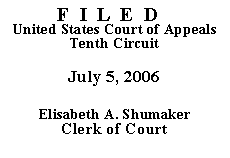

| UNITED STATES OF AMERICA,
Plaintiff-Appellee,
v.
RACHEL CHAVEZ Defendant-Appellant. |
No. 05-1144
(D.C. No. 04-CR-340-WM) (Colorado) |
Ms. Chavez was charged in a four count indictment with making false statements in violation of 18 U.S.C. § 1001. In December 2004, she entered into a written plea agreement whereby she agreed to plead guilty to one of the counts against her in exchange for the government's agreement to dismiss the remaining counts and recommend a sentence at the bottom of the guideline range. Ms. Chavez understood that by pleading guilty she was giving up her rights to a jury trial, to the presumption of innocence, to being found guilty by proof beyond a reasonable doubt, to her right to confront witnesses, to the right to be free from compelled self-incrimination, and to compulsory process. She adopted the recitation of the facts set out in the plea agreement as the factual basis for her plea and was informed of the penalties for her offense. Ms. Chavez was sentenced on April 19, 2005, to five years probation and no jail time, and restitution payments of $17,636.00. Her sentence fell at the bottom of the zero to six month range of permissible sentences for her crime. Ms. Chavez filed a timely notice of appeal, asserting her wish to challenge her sentence.
In the Anders brief, counsel notes that because Ms. Chavez pled guilty, "the only possible avenues for appeal would be irregularities in the guilty plea, or sentencing errors." Aplt. Br. at 4. Counsel first reasoned there were no grounds to challenge Ms. Chavez' guilty plea because it was knowing, voluntary, and fully complied with Fed. R. Crim. P. 11. See also United States v. Gigot, 147 F.3d 1193, 1197 (10th Cir. 1998) (guilty plea must be knowing, intelligent and voluntary). Counsel asserted that because Ms. Chavez received the minimum sentence required by statute for her plea, admitted to the facts supporting that sentence, and the district court engaged in a full examination of the 18 U.S.C. § 3553(a) factors in the course of sentencing her, there was no basis to challenge her sentence pursuant to either Blakely v. Washington, 542 U.S. 296 (2004), or United States v. Booker, 543 U.S. 220 (2005).
Ms. Chavez has not responded to her attorney's Anders brief, and the government has likewise declined to file a response. Pursuant to Anders, we must conduct "a full examination of all the proceedings" to determine if Ms. Chavez's appeal is wholly frivolous. 386 U.S. at 744. The record indicates Ms. Chavez was fully aware of her rights and of the impact of her guilty plea. Rec., vol. I, doc. 18, 19. There is no indication that her plea suffered from irregularities or was accepted in derogation of the requirements of Fed. R. Crim. P. 11. Because Ms. Chavez admitted to the amount of loss used to establish her sentence, and because she received the minimum sentence for her crime, any Blakely argument is precluded. Finally, while she was sentenced after the Supreme Court's decision in Booker, there exist no grounds for her to challenge her sentence for unreasonableness with reference to the factors laid out in 18 U.S.C. § 3553(a). See Booker, 543 U.S. at 261. The sentencing transcript makes clear the district court gave proper consideration to § 3553(a)'s statutory factors in giving Ms. Chavez the lowest sentence possible for the offense.
Based on our full examination of the proceedings, we conclude there are no non-frivolous issues for appeal. Accordingly, we DISMISS the appeal and GRANT counsel's request to withdraw.
ENTERED FOR THE COURT
Stephanie K. Seymour
Circuit Judge
*.After examining appellant's brief and the appellate record, this panel has determined unanimously that oral argument would not materially assist the determination of this appeal. See Fed. R. App. P. 34(a)(2) and 10th Cir. R. 34.1(G). The case is therefore submitted without oral argument. This order and judgment is not binding precedent, except under the doctrines of law of the case, res judicata, or collateral estoppel. The court generally disfavors the citation of orders and judgments; nevertheless, an order and judgment may be cited under the terms and conditions of 10th Cir. R. 36.3.